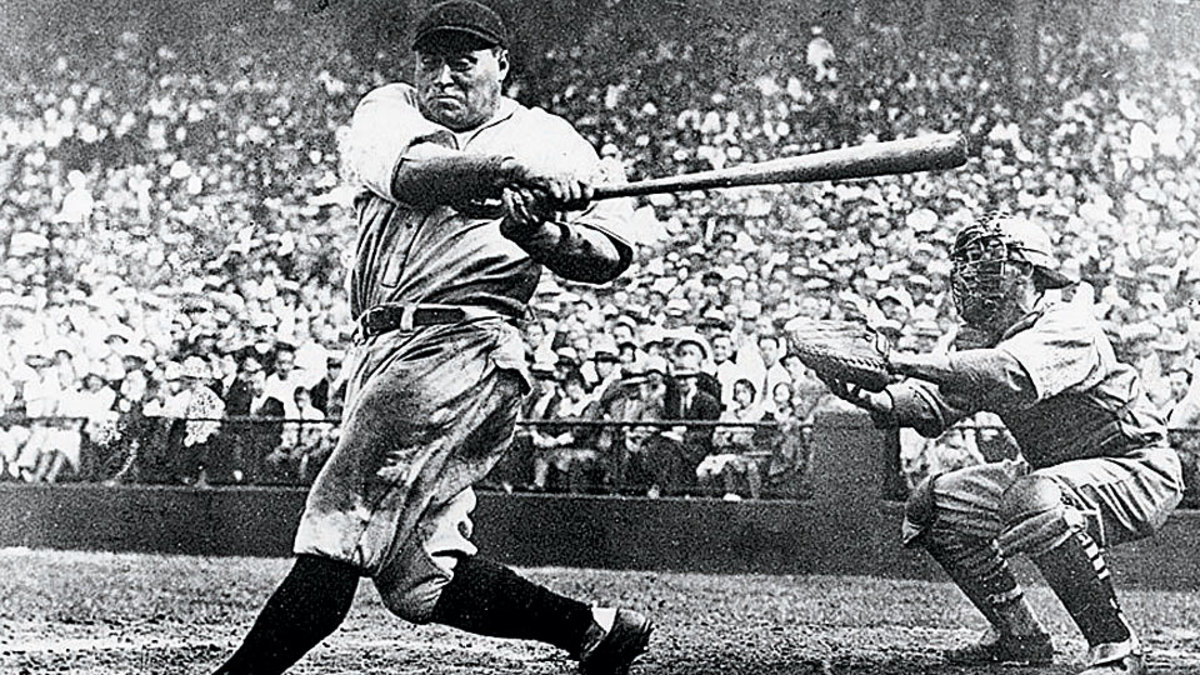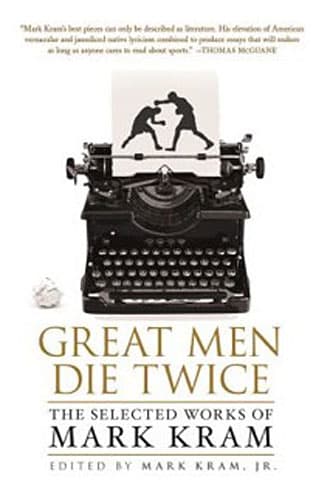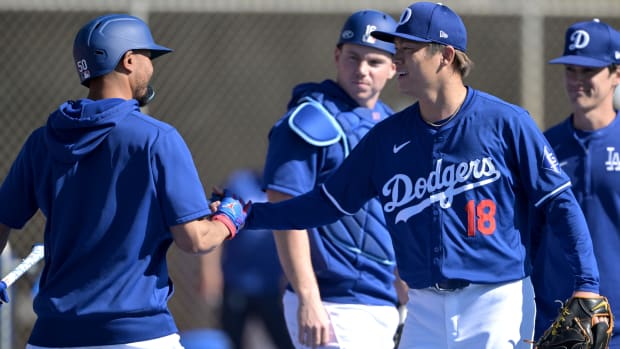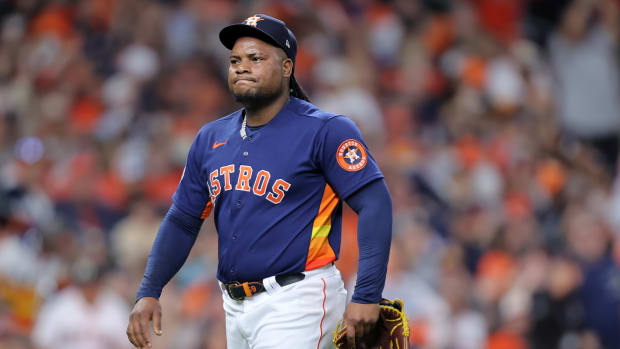SI Vault: Why Ain't I In The Hall? The Cooperstown case for Hack Wilson
This story originally appeared in the April 11, 1977 issue of SPORTS ILLUSTRATED. The author is Mark Kram, whose son, Mark Kram Jr., is the editor of the new book Great Men Die Twice: The Collected Works of Mark Kram. To purchase a copy, click here.
LEWIS ROBERT (HACK) WILSON
Born April 26, 1900, at Ellwood City, Pa. Died November 23, 1948, at Baltimore, Md. Height 5.06. Weight 210. Threw and batted right-handed.
I've been dead just about 30 years now, since Nov. 23, 1948, to be exact. I didn't much like the idea at the time, but what can a man expect who abused himself so badly? Now, having long ago gotten used to my present state, I look back and see a lot of mercy behind the moment. F. Scott Fitzgerald, that writer fella, whose own end came several years before mine, told me I was a fool for being so grateful; he's still mad as a hornet. "I had so much left in me," he shouts. And I say, "Yeah, but you should've thought of that when you were working double time in all those Paris joints." I could have kicked myself for saying that, because he's such a soft, gentle guy, and besides look who's talking.
Maybe Fitz has got a point, about his death, that is, not mine. Mine came at the right time. I was miserable, having been cut off from the only world I ever knew—sunlit ball yards with that smell they all had, the feel of a good piece of wood in your hands and the sweat pouring out of you. Maybe you miss a couple of pitches, and the crowds in those stands that seemed to be pushed up so close to you would begin to roar until, waiting for one more swing, the sound was like one of them Chicago elevateds bearing down on you hard. And suddenly, there the ball was, with its tail snaking up and down, its newness and speed making this hissing noise. In the time it takes for one heartbeat, I would have all of that white. Sometimes. I never knew a better feeling in all my life. It was like finally getting to an itch in the middle of your back. So what could come after that, after I'd finally ruined it all, after all those protectors of the game's sacred-ness who would never forgive or let me forget? Where was I going in the year of '48 on that damp day in Baltimore? Oh, I had been dead inside for so long, and publicly forgotten for more than 10 years. My name was gone like a click, and nobody remembered me much, except some barroom historian when they were sweeping out a joint before the sun broke.
My name was Hack Wilson. Baseball was my game. I really don't know what I'm doing here talking like this. It's never been my style. You could put my ego under a sway-backed ant. Well, maybe that was my trouble, among other things. I never spoke up much for myself. And I don't want it to sound like I'm pleading now, but right is right. I've waited for some reporter to come along—oh, how I've waited—to give me my due. to bring to life the man who drove in 190 runs one year (Babe says that's one record they ain't never going to get) and hit more home runs in one season—56—than anyone else ever has in the National League. But they all act like I died owing money to their grandfathers. The only time my name ever comes up is when somebody looks like he might get near the RBI record—if the season was 80 games longer. That's all I come down to: some lines in the record book. Yet, I guess I can understand these new reporters. Putting together someone's life who's been dead for 30 years is like a man chasing his hat in a high wind. Pretty soon he sees himself chasing the hat, which is blowing farther and farther away, and he begins to feel stupid and lets the hat go. He says to himself, "Who gives a damn, anyway?"
SI 60: 'Lawdy, Lawdy, He's Great'
My trouble is that nobody even thinks about chasing the hat. I'm not news. I'm not even a good feature story. None of the guys still alive, like Waite Hoyt or Freddie Lindstrom or Charlie Grimm (see how long a man can live when he keeps his life in order?), knew me well enough to put me together. Sure, I was one of the boys, but nobody knew who I was or how I felt. They used to laugh me off; I was a very funny man to them. Hell, half the time I didn't know what I was about. Ballplayers didn't sit around and think about themselves much in those days. And all the stories done on me at the time, they were like beer without a head. The writers could've done better. It wasn't that they didn't know something about me. I used to drink with some of them, lend them money and laugh with them long into the night. I was a good talker. Toward the end, though, I stopped talking to most of them. I got sick of the way they made me look in print. Like a jungle boy, some creature who'd dropped into Wrigley Field from a tree. I was their creation, I guess they thought. It wasn't even a good creation. Not like Babe Ruth. They laid it on thick for Babe. I could've used some of his New York writers.
So as baseball opens another season, I think it's about time I said my piece. I've sat back with everything bottled up inside and watched what's been going on for a good while now, and I think I deserve my due. Babe says I got it coming. I belong in the Hall of Fame. There! I've said it. Never thought I could ask anybody for anything, and I'm not really asking now. I just want them committee members to take a look at Hack Wilson again. It's one thing being dead, you see, but it's another being ignored. I must confess I never gave much thought to the Hall of Fame until lately. Awards never meant nothing to me; it's how a man works at his trade that counts, what he does with the tools he has. But over the years I've seen a lot of curious players being put into the Hall. I'm not going to name any names. And I'm not going to compare myself with more modern players. Those arguments are never settled. I hear them all the time. Old men tell me broads aren't beautiful anymore because they haven't any meat on them. Some even claim the weather is lousier than it used to be. They talk as if no rain never fell when they were kids.
You can't move people around in time. I mean you can't say things like Grover Alexander was a better pitcher than that wonderful case out in Deetroit now. What's his name—Feederich? Alex's got the figures, that's all I know. And so have I. You can't blow away the figures. My figures, the way I see it, put me in the Hall. Take those 190 RBI sin 1930. Lou Gehrig got 184 in '31, but that's the closest anyone's come. Just think about those 190. How often you have to hit in the clutch, how often that ball has to be hit cleanly somewhere. You need some luck, but it's never a fluke when you bat around those kinds of runs. I was a player of flesh and blood, too. I mean I made people love me or hate me. Or laugh. But I never influenced my age, if that's what being immortal is about. What's immortality, anyway? Look at history. Kings and generals seem to work by themselves, as if their battles were fought without armies. Guys who can tell you all about the Babe's 60 homers can't name most of the other regulars on his teams. Who were the guys who blocked for Red Grange? Who caught Johnny Vander Meer's two straight no-hitters? I feel like one of these questions now. Who's the guy who drove in 190 runs? Hell, I wasn't no supernumerary or whatever you call them. I wasn't no valet to the famous. I was famous. I left my personal stamp on the game.
They called me Caliban, who, if you don't know, is this savage and crooked-shaped slave out of Shakespeare. I didn't know what they meant at first, but then I caught on after a couple of years and I didn't like it much. I'd like to have a buck for every name I was called. When I think back to it, I'm glad I don't have to look at that shape anymore. I had an 18-inch neck, 16-inch biceps and sometimes as much as 230 pounds—and I stood only 5'6" high. My legs were ridiculous stubs that bowed like an ape's. I must have had the smallest feet—size 4½—next to Tom Thumb and small, very small, and delicate hands. I couldn't hold a regular bat; I had to have one with a reed-like handle that I would whip out at those high outside pitches. Many of my drives went to right and right-center. That takes strength. All my power was up in my shoulders, my upper torso. When I came up, no uniform could be stretched to fit me. I was a mess then, but later on, you would've called me a sawed-off Babe Ruth.
Half the time, I looked like I'd been rolling in a coal bin. I didn't invent the belly slide, but I sure did use it more than others. I could run, even though sometimes my mind might be elsewhere. Old John McGraw saw me thrown out at second one time on a single, and he roared, "Wilson, did you ever hear of speed?" "Sure," I said. "That's what pays off in horse races, isn't it?" So there I'd be with ridges of dirt on me and an overlay of tobacco juice, running with my head down and my cap flying off, showing everybody my bowl haircut; I went to better barbers later. McGraw demanded I at least get a shave. The pride of the Giants, he said, was at stake. "I can't shave," I told Mac. "I got some kind of skin itch. The razor only makes it worse." "Holy God in heaven," McGraw yelled. "Don't tell me you're lousy, too!" McGraw grew impatient with me, particularly after I had a brawl with one of his outfielders, Jimmy O'Connell. Mac was told about it the next day. "O'Connell's down." the guy told him. "Wilson's just knocked him over the piano. O'Connell's up! Oof! Wilson just socked him back over the piano. Jimmy's getting up again!" The guy was telling the story so well that Mac became afraid that O'Connell might get hurt. "Jimmy," Mac howled, "for the love of Mike, shove the piano over on top of him!" Mac finally built a doghouse for me.
Don't get me wrong, I don't think I'm one of those immortals history is always serving up. They can deal around me. I had a good fan who raised 10 kids on a factory worker's pay, giving all of them schooling and character. That's immortal! It's just that I've been getting heated up of late. The Babe, you see, keeps needling me about not being in the Hall of Fame, and I got to admit I'm starting to feel desperate. All I want is to be remembered. Now, it looks like I got one more chance to make it. That's if the Baseball Writers Association has anything to say about it. They made a proposal to the Veterans Committee that it should start picking two players a year who failed to make the Hall in the 15 years they were eligible. These two players would be on the ballot with everyone else. They'd be well publicized as "second-chance" candidates. If they didn't make it this time, they'd never make it. Here's where it gets sticky. The second-chance candidates would be limited to those playing after World War II. The Association wants the book closed on the rest of us. So it goes.
You can see why I'm getting edgy. I don't know why it's come down to this. I think in the past some of the writers thought that I didn't play long enough. How long is long? I played 12 years in the majors, had six great years. How many big years did that Sandy Koufax have? I'll tell you. He had six, and he got in the Hall the first year he could. And his big records—all them strikeouts and all them no-hitters—most have been tied or broke by now. This ain't no slur on Koufax. Just making a point.
Then, there was all the mistakes I made in the 1929 Series. That didn't help any. I think old Bill Terry, who's a committee member and managed the Giants, told them it was a bum rap. But the worst break came after my career. Bob Broeg, the St. Louis writer, will tell you. "My assumption," Broeg says, "is that a lot of writers back then held Wilson's short career and personal behavior against him." Now, there it is out in the open, and that's a nice and fair man giving it straight. My behavior. What behavior? Did I steal from anybody? Who did I ever hurt by being mean? Didn't I always give my club a day's work for a day's pay? I sure wish I had the Babe's writers. He didn't need them. I did. Look at him, he's over there laughing his butt off.
End Of The Glorious Ordeal: The night Hank Aaron passed Babe Ruth
Yeah, well, I've been coming close to the Hall lately. I understand I missed by one vote this year. And from the voting, it looks like a lot of these young fellas playing today have made them guys on the committee think twice about bad old Hack; the players out there now make me look downright saintly. Broeg, who's also on the committee, says there's been other things working against me. "We only get to elect two players a year." he says. "We also feel obliged to look into the pioneers of baseball. It's an obligation to the historians. So that leaves us just one more player. This year we put Joe Sewell in. Human nature being what it is, you know, Sewell, who is alive, can appreciate it now. It's a matter, I guess, of human frailty. I don't necessarily adhere to that view, but some others may have." O.K., I'm not human anymore, you can have that. But history! What's more historical than those RBIs and my 56 home runs? I broke my tail that year, even though half the time I was hung over. Few players have ever had a year like I did in 1930.
I don't recall how they came, they just came. Nobody made much over RBIs back then. They just wanted to see the big poke. The Elgin Watch Company gave me a watch for each home run—my friends had a lot of watches—so I can't say I didn't know what time it was in-some speakeasy at three in the morning. But just recently a gent by the name of Emil H. Rothe of Chicago came up with a breakdown of those RBIs. He says only 23 of my 56 homers were with the bases empty. But my other homers drove in 41 teammates, so altogether my homers accounted for 97 of my RBIs. None of the homers were hit with the bases loaded. Singles added 48 more RBIs, doubles picked up 26 and triples brought home five. I got eight more on sacrifice flies, four on fielder's choices, and I walked twice with the bases full. That Rothe should've been one of my writers. Kind of boring, yeah, but that's the kind of stuff I could use now. It keeps people's eyes trained on the serious side of a man. It shows them I wasn't all play. But my Chicago writers, they just kept hounding old man Veeck, William Veeck Sr., boss of the club: "Where was Wilson last night? Look at him, must of drank up all of Al Capone's bad booze!"
I don't know where he's been," the old man used to say. "All I know is that he never comes to the park from the same direction twice."
Veeck was Dutch. I was what they call Pennsylvania Dutch. I was born Lewis Robert Wilson in Ellwood City, Pa., a little town on the western border of the state. I don't know how the name Hack came about when I started playing in the majors. Maybe it was because I looked as if my body had been hacked away. I was a sight, I know that. My father was a hammerman in the steel mills. My mother died young. We moved to the other end of the state, to Chester, near Philadelphia, and I started working when I was 14 as a printer's devil, then on the railroad. At 17, I already weighed 160, and baseball was in my bones. I finally hooked on with Martinsburg, W. Va. in the Blue Ridge League. After a couple of years I was sold to Portsmouth, Va. In 1923 I hit .388 there. The owner, Frank D. Lawrence, said he was going to sell me to the majors where I belonged. He wanted $10,000 for me. The scout for the Giants went back to McGraw and said, "I wouldn't give 10¢ for him. He looks like he's standing in a puddle." There were a few days left in the draft, so Frank D. Lawrence went up to New York to see McGraw. He was up against a tough poker player in McGraw.
"Look, Mr. Mac," Lawrence said, "let's get down to business. I know you want Wilson."
"What do you want for him?" said Mac, laughing.
"I want $25,000," said the owner.
"You want $25,000 for a bush-leaguer?" shouted Mac, hitting the ceiling.
"You'll never regret it," said Lawrence.
"They tell me he's too fat," said McGraw.
"That isn't fat, Mr. Mac," the owner answered. "That's iron. He's the strongest man in baseball."
Well, Lawrence made McGraw a proposition. He would sell me for $5,000 if McGraw would pay him $1,000 for every point I was hitting over .300 by May 15 the next season. If I was under .300, then the deal would close at the original five grand. McGraw was impressed. He always liked the give and take of deals. But he backed off and gave the owner $11,000 for me. He saved a lot of money. By May 15, 1924, I was hitting .371. Mac saved himself $71,000.
I played 107 games that season, but only 62 the following year before—I've never been able to get to the bottom of it—McGraw sent me down to Toledo. He later said he lost me in a clerical error, that somebody fell asleep and the Giants forgot to exercise their option. Can you imagine Mac ever making a mistake like that? "Best thing that ever happened to you, kid," Babe is over there saying. "New York wasn't big enough for both you and me."
I was picked by the Cubs in the fall draft, and that would be my making and my undoing. The Cubs were made for me. I loved Joe McCarthy, the manager, who took a lot of heat because of me. I don't know what to say about old man William Wrigley. His son P.K., who still has the club, knew me back then. The only thing P.K. remembers is that I was strong and used to help load trunks for road trips. How do you like that, the way I played for his old man?
Oh, it was something to be a star in the '20s. The whole country went on a binge after World War I, and I was right in the middle of it. Chicago was an open city; anything went. I wasn't wearing any more of those cheap, loud, checkered suits, a little too tight for me, like the $17.95 job McGraw first saw me in. I was wearing silk shirts, big silk ties with flowers on them and beautifully cut double-breasted suits. But the clothes didn't help me much. I'd always look like a bulldog coming out of a blanket. Worse than that after a long night in the speakeasies. I was crazy about speakeasies. They were romantic places. As soon as you walked in, you were a special person in a special group. The places had an unreal feeling to them. The women looked more beautiful. Everybody shook your hand. The years were wild. There was something in the air. Athletes, well, they had become important. The writers later called it the Golden Age of Sports. I used to like the neighborhood bars on the North Side, too, and sometimes I'd go over to Al Capone's club. That got me in trouble. Capone came out to the park one day, and I went over to greet him. Later, Judge Landis, the Commissioner back then, called me on the carpet. He was real fired up. "What are you doing talking to that gangster?" he asked. I said, "Well, Judge, I go over to his place, so why shouldn't he come to mine?"
Joe McCarthy, he had to be a saint to put up with me, what with the press and moralists yapping at his heels. But I seldom let him down. He's 90 now, and he says to this day, "No tougher player ever lived than Hack Wilson. We didn't have any superstar status in his days, but if there had been, he'd've had it." Joe never had any bed checks. If a guy was ready to play, that was it. Still, he didn't want me to think I was fooling him. He'd always ask to see the matchbooks in my pocket so he could see where I'd been the night before. He'd play me on those terrible hot days when I could barely crawl. On one day like that, I hit two homers right off, and Joe came up to me—I'm ready to be put out of my misery—saying, "You go in now, take a shower. I don't want you to miss your rounds tonight." Joe tried hard to reform me. He even tried a little experiment on me in the clubhouse, calling me over and setting up two glasses, one full of water and one full of gin.
"See this here, Wilson," he said. "Watch what I do here. Watch closely." He pulled out a worm and dropped it into the glass of water. The worm just wiggled around.
"Now," he went on, "look at this." He pulled out another worm and dropped it into the glass of gin. The worm dropped to the bottom. Dead.
"Now, what does that go to show you?" he said quietly. "That worm's dead, Wilson. Does that mean anything to you?"
"Sure, Skip," I said. "It just goes to show you that if you drink, you'll never have any worms."
I went right on belting down a glass of gin before warming up. I wasn't hurting Joe. I was hurting myself in the long run, sure. But I was loyal to Joe. I wanted to please him, and when I didn't, he'd be there shaking his head, saying, "Don't you like me, Hack? Don't you want to play for me? You're letting me down."
The Mantle Of The Babe: Mickey Mantle eyes Babe Ruth's home run record
That would put me on my knees just about, and I'd be nearly crying inside. I only let him down once real bad. It was in the '29 Series against the A's, who had Lefty Grove, Al Simmons and Jimmy Foxx. That was one of the best teams ever—and so were we. We had Pat Malone, Kiki Cuyler, Charlie Grimm, Gabby Hartnett, Rogers Hornsby and Riggs Stephenson. They beat us, and I helped them do it. We were leading 8-0 in one game, and there was a long fly ball hit to me in center field with the bases loaded. I looked up. I couldn't see it. I began to panic. Where was the damn thing? I never did find it. Then another fly. The same thing! My mistakes opened the door for the A's to win the game and the Series. After that, I walked around in a daze. I was the first guy to hit .400 in a Series and be the goat. McCarthy was heartbroken. He still hadn't gotten over it by spring training. I was out in left shagging the balls, and some kid came up to Joe and pestered him for a ball. The kid kept after him, until Joe, getting a little annoyed, turned to him and said, "Son, do you see that fat fella out there in the outfield?" The boy nodded. "Well," said Joe, "you just stand behind him, and you'll get more baseballs than you know what to do with."
They called me Sunny Boy Hack after the '29 Series. The fans turned on me. They thought I'd been drunk during the Series. The press fed the fire. I became a cartoon character. Joe was under pressure. I'd go into the stands after the fans, but I couldn't take on the whole city. I'd go into a saloon, and the ones who used to drink to me would turn away. It was hell. I began to drink more, if that was possible, and the trainer, Andy Lotshaw, would try to slap me awake on the rubbing table. Bill Veeck, son of William Sr., used to follow me around when he was a kid. He remembers: "One day Andy had Hack sobering up in one of those big, high old tubs. In the tub with Hack was a 50-pound cake of ice. Well, what would you do if a 50-pound cake of ice jumped into your bathtub with you? You'd try to jump out, right? Hack's body was blue. Every time Hack's head would bob up, Andy would shove it back down under the water, and the cake of ice would come bobbing up. It was a fascinating sight, watching them both in perfect rhythm: first Hack's head, then the ice, the head, then the ice. That day Hack Wilson hit three home runs for the first and only time in his life. I still can't believe it."
To tell you the truth, I can't believe 1930 myself. I may have needed a compass to find home plate, but I hit 56 homers, seven more than Ruth, drove in those 190 runs, produced 280 of the 998 the Cubs scored, and became the Most Valuable Player. But I was feeling it inside. One night I woke up on a road trip, sweating and screaming, "Get out! Get out! They're after me!" My pal Pat Malone grabbed me by my nightshirt just in time. I was on the windowsill. There wasn't much iron in me anymore. With four games to go, they fired Joe McCarthy and made Rogers Hornsby player-manager. That was the beginning of the end for me. The next year was awful; Hornsby was on me all the time, looking for an excuse to get rid of me. He wanted to be the big man. He resented me. He was a selfish guy who'd get his own way or bust. It was all right for him to play horses and chase women, but I was some kind of bum. The guy was like a cop. You couldn't read a paper or smoke in the clubhouse. You were lucky if you got to read your mail. You came in and sat like a monkey on a chair. No laughing or playing around. He ran the place like a Sunday school. Besides that, he took the bat out of my hands on those 2-0 and 3-1 pitches I used to feast on. I had to take a lot of cripple pitches. He eventually suspended and fined me.
That season Hornsby hit me with $6,000 in fines, and I couldn't afford it. I was making upwards of $40,000, but gambling and bad investments had taken care of most of it. I had a bad year in '31. Only 13 homers, a .261 average and 61 RBIs. The Cubs sold me to the Cardinals, who moved me on to Brooklyn. I wasn't happy. One day Joe Judge, one of my teammates, found me sprawled in front of my locker, empty bottles all around me. "My God," he said, "they'll fire you for this. They want you out there to hit. I'll clean up the mess." After the game, they all came in and saw the bottles in the trash can and just laughed. It didn't matter. This fat man, you see, had clubbed one out of the park. But who was I kidding? There wouldn't be many more. Soon Casey Stengel, who had a sense of humor, became manager, and the incident occurred that summed everything up. Even now, I don't know whether to cry or laugh. We were playing the Phillies in their little bandbox. Boom-Boom Beck was pitching for us. Now, there was a pitcher with a perfect name. The hits off him used to make a boom sound against the fence. It wasn't any different against the Phillies this time.
Hits kept clattering off that tin fence in Baker Bowl. The noise was enough to make you deaf. My ears were ringing. My tongue was hanging down to my knees in the hot right-field sun. Finally, Stengel comes out to relieve Boom-Boom of his pain. But Boom-Boom doesn't think he's in pain. He keeps jumping up and down and waving his arms, and I figure I'll take a breather in the shade. Then, suddenly, I hear this terrible noise from that tin fence again. Off I go, chasing the ball. I run it down, wheel and make a beautiful throw to second base. The whole place is in an uproar. I'm asking myself what's going on, and now I see what happened. Boom-Boom, you see, wouldn't leave the game without one more boom. He had turned and heaved that ball right off the fence. I was stunned. Later Stengel said, "Wilson, let me tell you, you never made a better throw in your life. It was right on the money—but it was a bank holiday." It was good for a laugh, but I couldn't laugh anymore. The rest was downhill. I drifted around on some semipro teams after the Dodgers and then the Phillies let me go. In a little while I was forgotten. Veterans Committees forgot me. Nobody wrote my life story. The Hall of Fame was closed. I was baseball's shame.
SI Vault: Flame Thrower: Cubs phenom Kerry Wood strikes out 20 Astros
I lived with my wife and my son Bobby in Martinsburg for a time, but I got restless. I spent a lot of time chasing around and fighting people in my pool hall. Sometimes I wouldn't come home for days. My poor wife divorced me in 1938, two years before she died. And I feel bad that my son scarcely remembers me except as a public figure. He's a 51-year-old elementary school principal, a book reader, a bachelor, as different from me as night and day. Now that the Jaycees have begun a drive to get me into the Hall, Bobby is trying to help. But for years he wouldn't even talk about me, and I can't say I blame him.
I went back to Chicago and ran a couple of saloons, then ended up in Baltimore during the war. I got lost there. None of the baseball men there knew I was in town, and I never went to the minor league games. It hurt too much inside. I stayed to myself, eating my heart out. I used to kid myself that if I had it to do again I wouldn't change a thing. Deep down, I knew better. It's all there one minute—then it's gone. Don't ever let no ballplayer tell you he don't miss the game, the crowds, the light on you all the time. It's painful to break away. I ended up getting a job at a swimming pool, then in the public parks. I used to get the baseball diamonds ready for the kids to play on. You know, running the foul stripes down the lines, raking the infield. Now and then, I'd get one of them kids aside and try to teach him how to handle a bat. I'd spend the nights in those dark little neighborhood bars that reminded me of Chicago. I'd sit for hours over glasses of beer, sometimes till they closed. I used to do a lot of thinking in those bars. About the way it'd been.
I thought back to when I was a kid, and how they never let me forget I was ugly. The other kids would ask me what tree I lived in. They'd tell me not to step on my tail. At first, I couldn't fix the creeps, but later I sure did square it. I guess I was what you might call a natural man. Maybe, as the writers always said. I was a primitive, too. If you got personal with me, you only had one choice: fight. Once, when I was young and had a job cleaning out spittoons in a saloon, a guy hollered, "Hey, freakie, come on over here!" I almost broke his neck with a headlock. I knew I was ugly. I didn't need anybody to tell me.
I didn't bring much respectability to the Cubs, but I brought a million or more fans into the park for them every year. The headlines, though, used to turn the stiff necks even stiffer: RAID ON BEER FLAT NETS HACK. WILSON TERRORIZES FAN IN STANDS. RAILWAY DEPOT BRAWL BRINGS RIOT SQUAD—HACK'S IN THE MIDDLE AGAIN. The last one was the time when me and Pat Malone nearly cleaned out the whole Cincinnati team over something that happened in the game. The fat man could hit with either hand. With the kick of 30 mules.
The thoughts would go on, adding up to nothing, but adding up to everything, it seemed, after a few beers. Before I was 30, I'd been in enough trouble for a gang of sailors. The Anti-Saloon League wanted me declared a menace to society. One of its officials once came up to me, then ran out screaming when I stuck an electric buzzer under her petticoat. Judge Landis was always on me, especially after he showed up for one of our games and saw me play a line drive into an in-side-the-park homer. "The old man's raving." they told me. "He's going to throw the book at you. He thinks you're drunk." I went to see him the next day, and there he was, pointing his bony finger at me and telling me what he's going to do. I let him finish. Then I said, "How much of the game did you see?"
"I left," said the Judge, "directly after your disgraceful exhibition. Don't lie Wilson! I know you were under the influence."
"Well, if I was," I shot back, "how come I doubled in the seventh and homered in the ninth?"
But nothing could stop me then, not even the Judge. The fans rolled into Wrigley Field, and old man Wrigley's eyes gleamed over all the money his team was making. "We'll have a bodyguard on Wilson," he ordered, thinking about protecting his gate receipts. The guard stuck with me for two days. I introduced him to a waitress who, he later claimed, spiked his drink and put him on a bus to Keokuk, Illinois. He was right. In all, I must have been fined something like $20,000 during my career. I wasn't proud of the way I'd been, sitting there in a saloon and thinking back. I was paying for it now. Alone. An old, old man at only 48. Barely able to afford a beer, since I quit the park system. People used to say I would die friendless and penniless. I did. I remember the day well.
It was cold and damp, nothing special about it. I remember having passed a Chinese restaurant, advertising full-course meals for a buck. I didn't like Chinese food, but I made a mental note to get in on that. All I had to my name was a dollar. I thought of all those $10 tips I used to pass out. So here I was just about broke, threading my way back to my room as the lights were going out in the bars all over town. That was always the loneliest time for me. I finally got to the top of the stairs of my rooming house. Then I seemed to lose my balance. They found me later at the bottom of the stairs and took me to the hospital. I died there. A pulmonary condition complicated by internal injuries, they called it. They couldn't find anybody who knew me. The rumors began to spread that I died in the gutter. I guess a lot of people started to collect their bets. Nobody claimed my body for two days. There was no money for a funeral.
Then all the boys from the bars passed the cup, and they came up with enough pennies and dimes to buy me a burial suit. The Elks Club members back in Martinsburg were hurt by the publicity, and they drove up in a long line of cars and took my body back to where it all began so long ago. I belonged to somebody. I was one of them. They laid it on good there. None of the baseball big shots showed up. My son Bobby wasn't there, either. That's all right, some people don't like funerals. Joe McCarthy came down later and dedicated a fancy 10-foot-high granite stone for me. It sits in Rosedale Cemetery on a nice slope between some Canadian elms and arborvitae bushes. The stone has a couple of crossed bats and a ball sitting on a bed of leaves, with an Alpha on one side and an Omega on the other. Pretty fancy, I'd say. The inscription reads: ONE OF BASEBALL'S IMMORTALS, LEWIS R. "HACK" WILSON, APRIL 26, 1900—NOV. 23, 1948, RESTS HERE. Hundreds of old Blue Ridge League fans stood in the rain at the burial. And many of them cried.
The fans never forgot Hack Wilson. Only baseball did.
EDITOR'S NOTE: This was Mark Kram's last story for SPORTS ILLUSTRATED. Hack Wilson was inducted into the Baseball Hall of Fame in 1979.





































